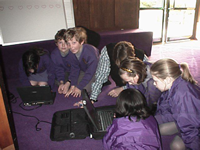Twenty Lessons from Twenty Years of 1:1 Computing
The presenter has led 1:1 implementations around the world since working with the first two “laptop schools” back in 1990. This presentation distills this unrivaled experience into a quick exposition of the lessons learned for professional development, planning and infrastructure, defining a vision, raising expectations, best teaching practices and bold imaginative classroom applications.
The presenter will share strategies that succeeded in schools across the globe and those that failed. He will also challenge some of the conventional wisdom regarding the rationale, expectations and implementation of 1:1 in schools today.
During challenging times when school districts face challenges involving finances and educational progress, it is critical that investments are prudent, aspirations high and leadership enabled to implement and sustain new approaches to teaching and learning in the 21st Century. This presentation is designed to help attendees achieve those objectives.
This will be done with wit, candor and examples from diverse school contexts. All of this “free advice” is offered to help educators create the richest possible learning opportunities for students today and into the foreseeable future.
The presentation will feature video-based case studies of students using personal laptop computers in imaginative ways. Tips for planning a successful 1:1 implementation, funding strategies, answers to frequently asked questions strategies for sustaining innovation and student achievement will be shared. Links to resources, information sources and research will be provided.

Creativity 2.0 – The Quest for Meaning, Beauty and Excellence
Authors and pundits stress the importance of creativity, but what does that mean or look like in classrooms? This session will address questions, such as: How do we get there? What do we need to change? Is creativity reserved for specific subject areas? Which hardware and software support creativity? What are the essential elements of effective project-based learning?
Technical ease is no substitute for artistic or scientific rigor. It’s about time that more students produce evidence of greater technological fluency. This session will propose how learners might use technology in imaginative ways to create expressions of value; to develop habits of mind, such as discipline; and contribute to a timeless cultural continuum and world of ideas.
Other keynote and workshop topics may be found here.
Download The Stager Difference explaining my speaking, consulting and PD services.
Veteran educator Gary Stager, Ph.D. is the author of Twenty Things to Do with a Computer – Forward 50, co-author of Invent To Learn — Making, Tinkering, and Engineering in the Classroom, publisher at Constructing Modern Knowledge Press, and the founder of the Constructing Modern Knowledge summer institute. He led professional development in the world’s first 1:1 laptop schools thirty years ago and designed one of the oldest online graduate school programs. Gary is also the curator of The Seymour Papert archives at DailyPapert.com. Learn more about Gary here.

